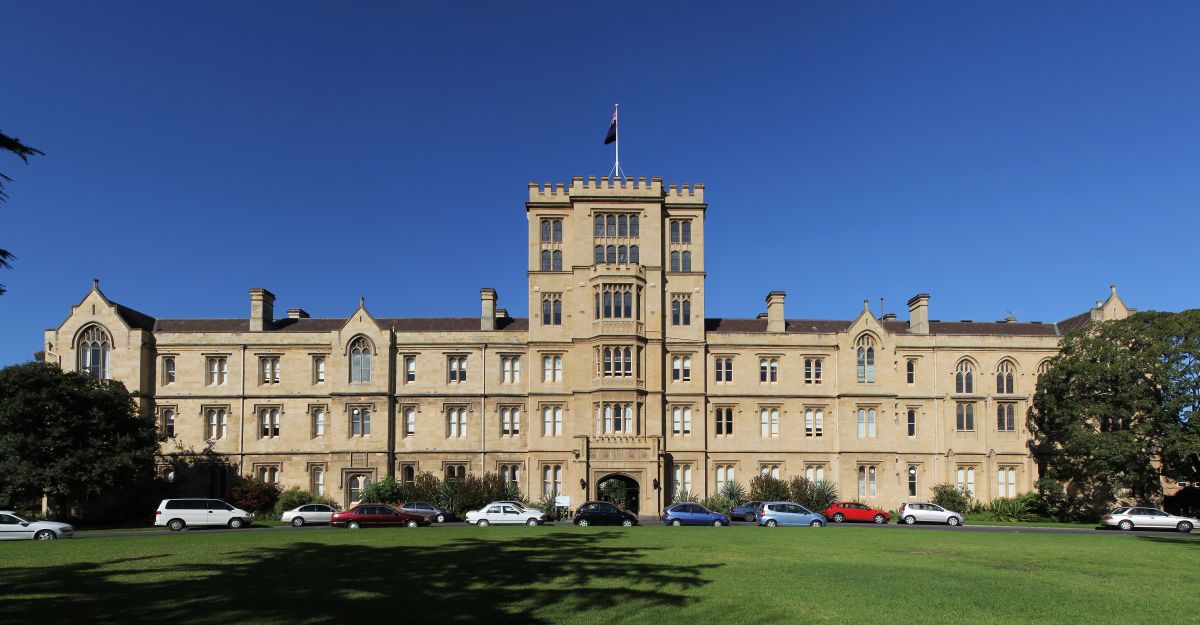Four months ago, Mark Scott succeeded Michael Spence as Vice-Chancellor of the University of Sydney. Scott’s predecessor was, in many ways, the Samuel Marsden of higher education—the ‘flogging parson’ who whipped the university into greater conformity with the prevailing sociopolitical order. Spence spent a decade at Sydney courting philanthropic donors and imposing chaotic and punitive austerity on teaching and research, the proceeds of which he used to fund grandiose building works and a mushrooming of senior administrative roles. He was rewarded for these achievements by appointment to the top job at University College London, a position he took up earlier this year after fastidiously decorating the Sydney campus with various monuments to himself.
Unlike Spence, Scott has no experience in higher education. He comes to Sydney following stints heading the NSW Department of Education and the ABC: in 2021, being a high-powered bureaucrat is, apparently, the only requirement needed to run a major university. He has never taught undergraduates, conducted research, or published an academic article. Alone among Australian Vice-Chancellors, and even unlike the CEOs of some large organisations, he does not hold a PhD. His appointment marks a further stage in the managerial occupation of higher education, and the progressive abandonment of any recognition of universities as specific institutions with their own distinct values. Untainted by any real understanding of what academics do, Scott is even better qualified than his predecessor to accelerate Sydney’s dissolution in the universal solvent of market rationality.
It’s unsurprising, then, that the first major operation of his Vice-Chancellorship is a frontal attack on Sydney’s oldest and most iconic faculty—Arts, the one that embodies the ‘idea of the university’ as the source of humanistic, non-vocational education intended to broaden students’ minds.
A massive neoliberal fist is now poised to swing into Arts at Sydney. Staff have been told that subjects with fewer than twenty-four enrolled students are to be discontinued. Autonomous departments—many of them the oldest in the country—are to be abolished, breaking even more sharply the bond between the faculty’s organisational structure and its educational and intellectual purposes. Academics in the new structure will be grouped into ‘disciplines’ under the thumb of academic managers. Most incredibly, perhaps, discipline-specific content is to be removed from many Honours programs, which will leave students studying more generic courses instead of receiving specialised education in their chosen field.
If management get their way, hundreds of subjects will disappear from the faculty’s books: according to figures analysed by the student newspaper Honi Soit, at least 252 of 478 undergraduate courses risk being cut, and 251 of 432 postgraduate courses. All these initiatives draw Sydney even further away from the international peer institutions it ludicrously claims to want to emulate. Many colleagues feel that this travesty will not only strip the Sydney BA of its academic credibility, but inevitably put their own jobs at risk.
At the other end of the fist being brandished in the faculty’s face looms a coalition of senior university bureaucrats: the newly-promoted university Provost, Professor Annamarie Jagose, who previously, as Dean of Arts and Social Sciences, masterminded the reforms; the previous temporary Vice-Chancellor, Professor Stephen Garton, another former Dean of Arts; and the faculty’s present interim Dean. So far, Scott has largely kept himself at arm’s length from the plans for the faculty. Now, however, the proposed changes have erupted into a major controversy, and he has a problem: how to decide what to do? Since he has no direct understanding of what academic work is actually like or how it is best organised, he will have to rely on others’ judgement about how the faculty and curriculum should be structured. But whose? The senior bureaucrats’, or the faculty’s academics’, who overwhelmingly oppose the changes? The insulation of upper management from the majority of the university’s staff would make it easy for Scott to ignore them if he wanted to. If he was smart, he wouldn’t want to.
In accordance with the collective agreement governing the university, some weeks ago staff were shown a draft outlining management’s intentions for the faculty and were invited to respond to it. In submission after submission, Arts faculty colleagues warned of the ‘risk(s)’, ‘clear risks’, ‘serious risk,’ ‘increased risks’, ‘very high risk’, ‘very strong risk’, ‘significant risk(s)’, ‘significant unknown risk’, ‘significant strategic risk’ or ‘massive risks’ entailed by different aspects of the plans. These risks concern such central factors as the faculty’s intellectual and academic integrity, its enrolments, its international standing, its navigability to students and community, and its finances, as well as the workload, mental health and morale of its members. These are hardly trivial matters, but the management responses to the feedback brushed them aside. The Provost and the interim Dean thanked academics for their ‘important’ input, and refused point-blank to engage with it.
Management claims that the new arrangements will ‘support’ research—even though the people whose research is supposed to be supported, the faculty’s academics, are telling them that it definitely won’t. Governmentality in the university, it would seem, knows academics better than they know themselves. But if management don’t even trust academics to know what will and won’t support their own work, it’s hard to see why they should trust them to do any other aspect of their jobs properly. This infantilising and contemptuous attitude from management towards highly-trained professionals has aroused greater anger than I have ever seen in the sixteen years I have worked at the university.
Management’s general rationale for the changes to the Arts faculty is that the university’s ‘business model’—a phrase used without any trace of embarrassment—necessitates it. Expenditure is growing faster than income, and the uncertain geopolitical situation means that international fee-income from Chinese students is no longer guaranteed—despite the fact that the proposed changes won’t actually save much money, and despite the university being in a better financial position now than predicted even in its pre-Covid forecasts. It has even just paid a $2000 Covid-bonus to all staff, including some casuals.
The threat to the university’s income, in other words, is potential rather than actual. But if higher education received proper federal funding, it wouldn’t be exposed to the vagaries of the international student market, and the potential of a decline in the number of students from China wouldn’t be so threatening. In these circumstances, Sydney’s leaders should be doing everything in their power to mobilise the university’s significant social capital in a public campaign for reliable government funding. Instead, they have completely surrendered to Morrison and Canberra’s other cretinous and scholasticidal policy-makers. As the NTEU argued in its submission on the changes in the faculty, ‘if the university leadership believes that higher education is facing an ‘historic’ challenge, then nothing less than an historic—public, assertive, determined—response from the university’s management is called for.’ Nothing of the sort is even being contemplated. Like the rest of the sector, the leadership at Sydney has simply forfeited the demand for properly funded, public higher education. And Arts is paying a higher price than any other faculty.
*
University education in the humanities, arts and social sciences should reflect the diversity of possible ways of being human. Among the courses to be discontinued, according to Honi Soit, are significant numbers (between seven and twenty-nine) from Education and Social Work, Hebrew, Jewish and Biblical Studies, Classics and Ancient History, the Sydney College of the Arts, Chinese Studies, Modern Greek and Byzantine Studies, Arabic Language and Cultures, Philosophy, Germanic Studies, Religion, Sociology, Economics and Italian Studies. All departments, indeed, will have fewer available subjects for students to study after the cuts.
A genuinely liberal—‘free’—education is oriented towards broadening students’ conceptions of the different ways of thinking and living that creatures like us can, together, make our own. Nothing could be further from the intention of the current leadership of Arts at Sydney. Their plans involve an uncritical embrace of contemporary ideological and political settings, and a slavish worship of a spectral and continually shape-shifting financial bottom line. This all entails a wholesale disrespect for and denial of the autonomy of both students and academics—with students to be forced into a narrower, more uniform range of intellectual pathways, and academics to be further excluded from any meaningful say in the organisation of their workplace.
At the same time as the reforms to the Arts faculty are to be undertaken, the university management, under Scott’s leadership, is pursuing a new collective agreement with staff that will marginalise and subalternise academics even further. Scott’s Enterprise Agreement, if he gets it, will remove academics’ right to conduct research as an inherent component of their job, deprive them of any participation in monitoring workload, and force them to negotiate their teaching-research balance with their head of school, annually. Any idea that research—the active pursuit of scholarly knowledge—is an intrinsic part of an academic’s job will be gone forever. Meanwhile, university management is bullishly refusing to make amends for the systematic wage theft it has perpetrated for years against its enormous casualised workforce.
All this amounts to large-scale vandalism of an institution whose value is widely appreciated, except by the people in charge of it.
*
Instrumentalisation of knowledge by politics runs deep in Australian history: Cook’s very act of appropriation of the continent for the British Crown in 1770 was accomplished under the cover of a scientific mission to Tahiti to observe the transit of Venus (observations themselves valued for their utility to marine navigation). Two hundred and fifty years on, university managers are putting the finishing touches to the total annexation of learning by the market. The logic of the globe-trotting careers of university managers means that they will never be held accountable for, let alone have to live with, the long-term consequences of their reforms: they will wreak havoc wherever they are currently based, and then, like Spence, vanish from the institution into some other senior job somewhere else, scot-free.
Humanities academics often talk about the intrinsically critical role of their disciplines, which they envisage as contributing to a smarter, more sensitive, more just world. This self-conception obscures the profoundly ambivalent role of the humanities in the contemporary political order, as I’ve explored in several other places. But if we want people to take claims of the social value of our work seriously, we cannot be indifferent to the institutional arrangements that embody them, and we have to make it a priority not to be complicit in the assisted institutional suicide to which we are regularly asked to contribute.
Academics have, of course, far better things to be doing than organising and polemicising against their own employers, an activity that occupies an inordinate amount of time that would be more satisfyingly spent on creating and disseminating knowledge. But when the structures in which that knowledge can be generated and spread are themselves threatened, we are left with little choice.
Not least among the ironies of the present situation is that the one clear way to improve the ‘performance’ of the university—the goal to which management, including Scott, continually professes its commitment—would be simply to abolish the managers, and let staff and students manage their own affairs, including their relations with Canberra. This would be an infinitely more rational, efficient, collegial and democratic model of institutional governance, thoroughly appropriate to the purpose of an institution of higher learning. The current command-and-control model favoured by university managers is light years away from this, and demeaning and time-wasting for everyone—university staff, students, and the managers themselves.
Nick Riemer is in the English and Linguistics departments at the University of Sydney. These are his own views.
Image: Flickr






